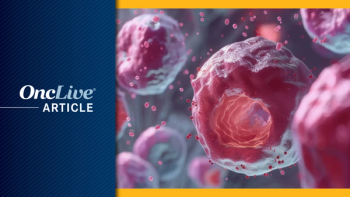
Pembrolizumab Improves Outcomes Regardless of Response to Prior Chemotherapy in Advanced Urothelial Cancer
Response to pembrolizumab monotherapy was observed regardless of prior response to chemotherapy in patients with advanced urothelial cancer.
Response to pembrolizumab (Keytruda) monotherapy was observed regardless of prior response to chemotherapy in patients with advanced urothelial cancer, according to findings from a post-hoc exploratory analysis of the phase 3 KEYNOTE-045 trial (NCT02256436) that were presented at the 2022 ESMO Congress.1
For this evaluation, the database cutoff date was October 1, 2020, and 542 patients were evaluated overall. The objective response rate (ORR) with pembrolizumab by best response to prior chemotherapy was 24.7% (95% CI, 15.3-36.1) for patients with a complete response (CR) or partial response (PR), 18.5% (95% CI, 9.9-30.0) for patients with stable disease (SD), and 19.6% (95% CI, 12.6-28.4) for patients with progressive disease (PD).
“In this post-hoc exploratory analysis, response to pembrolizumab monotherapy was observed regardless of prior response to chemotherapy in patients with advanced urothelial cancer,” the study authors wrote in the poster. “However, limitations of this study include a modest sample size, and responses based on investigator assessment of prior chemotherapy response were not reconciled by the sponsor using imaging data.”
The standard first-line treatment is platinum-based chemotherapy for patients with advanced urothelial cancer, but subsequent disease progression leads to low survival rates. This background led to the inception of the KEYNOTE-045 trial to assess the safety and efficacy of pembrolizumab monotherapy vs chemotherapy in patients with disease progression following platinum-containing chemotherapy.
Eligible patients included those with transitional cell predominant urothelial cancer of the renal pelvis, ureter, bladder, or urethra. Patients must have experienced disease progression after 1 or 2 lines of platinum-based chemotherapy or recurrence within 12 months of perioperative platinum-based therapy.
Patients must have had an ECOG performance status between 0 and 2, as well as measurable disease per RECIST v1.1 criteria and a tumor sample for biomarker evaluation.
Patients on the trial were stratified by ECOG performance status (0 or 1 vs 2), hemoglobin level (< 10 vs > 10 g/dL), liver metastases (yes vs no), and time from last chemotherapy dose (< 3 months vs > 3 months).
Patients were randomly assigned 1:1 to receive 200 mg of pembrolizumab intravenously once every 3 weeks for up to 2 years (n = 270) or 175 mg/m2 of paclitaxel once every 3 weeks, 75 mg/m2 of docetaxel once every 3 weeks, or 320 mg/m2 of vinflunine once every 3 weeks (n = 272).
The dual primary end points of the phase 3 trial were overall survival (OS) and progression-free survival (PFS). Key secondary end points included ORR, duration of response, and safety.
After 5 years of follow-up, pembrolizumab continued to demonstrate favorable efficacy, with an OS hazard ratio of 0.71 (95% CI, 0.59-0.86). In this post-hoc exploratory analysis, investigators evaluated whether prior response to chemotherapy and the type of chemotherapy received affects the efficacy of pembrolizumab.
For all treated patients, the median time from stopping prior chemotherapy to starting pembrolizumab was 4.0 months (range, 0.8-77.2). In patients with prior CR, PR, SD, and PD, the median time from stopping prior chemotherapy to starting pembrolizumab was 6.3 months (range, 1.0-77.2), 4.5 months (range, 1.0-43.5), and 2.3 months (range, 0.8-52.2), respectively.
Of the patients who received pembrolizumab, 73 experienced a CR or PR, 65 had SD, and 107 had PD to a prior chemotherapy; 25 patients had no assessment. A total of 180 patients received prior cisplatin and 90 patients received non–cisplatin-based chemotherapy. The non–cisplatin-based chemotherapies included carboplatin (n = 89) and oxaliplatin and nedaplatin (n = 1).
Of the patients who received chemotherapy, 71 experienced a CR or PR, 70 had SD, and 89 had PD to prior chemotherapy; 42 had no assessment. A total of 186 patients received prior cisplatin and 86 patients received non–cisplatin-based chemotherapy, which included carboplatin (n = 83) and oxaliplatin and nedaplatin (n = 3).
Regardless of response to prior chemotherapy, the median OS was improved in patients who received pembrolizumab vs chemotherapy. The median OS for patients who received pembrolizumab, and had prior CR/PR, prior SD, or prior PD was 27.8 months (95% CI, 19.4-34.9), 21.8 months (95% CI, 19.9-27.4), and 14.2 (95% CI, 12.0-18.7) months, respectively, vs 20.0 months (95% CI, 17.2-26.9), 19.1 months (95% CI, 15.4-22.7), and 12.2 (95% CI, 10.5-13.4) months in patients who received chemotherapy.
When evaluating patients who had received prior cisplatin-based chemotherapy, the median OS for patients who received pembrolizumab, and had prior CR/PR/SD, or prior PD was 22.1 months (95% CI, 19.1-30.0) and 14.2 months (95% CI, 11.6-19.3), respectively, vs 19.1 months (95% CI, 16.9-21.8) and 12.3 months (95% CI, 10.5-17.3) in patients who received chemotherapy.
In those who received non–cisplatin-based chemotherapy, the median OS for patients who received pembrolizumab, and had prior CR/PR/SD, or prior PD was 26.3 months (95% CI, 21.1-31.6) and 16.6 months (95% CI, 9.4-20.2), respectively, vs 21.6 months (95% CI, 15.7-27.1) and 10.8 months (95% CI, 9.3-12.8) in patients who received chemotherapy.
“Although patients with PD as best response to chemotherapy had numerically lower survival, these patients still responded to pembrolizumab treatment,” the study authors concluded.
Reference
Wit RD, Vaughn DJ, Fradet Y, et al. Impact of prior chemotherapy on pembrolizumab response in urothelial cancer: exploratory analysis of the phase III KEYNOTE-045 study. Ann Oncol. 2022;33(suppl 7):S1336-S1337. doi:10.1016/j.annonc.2022.07.1825



































